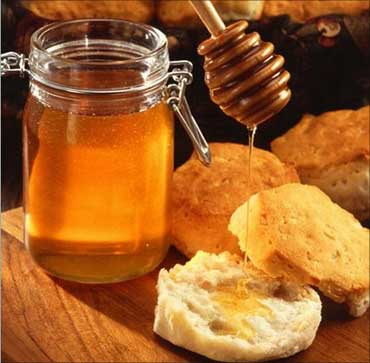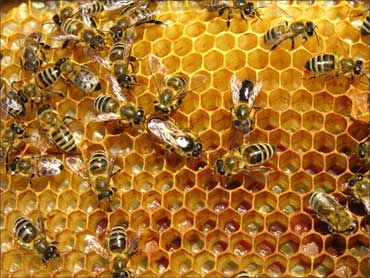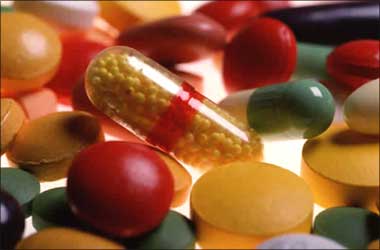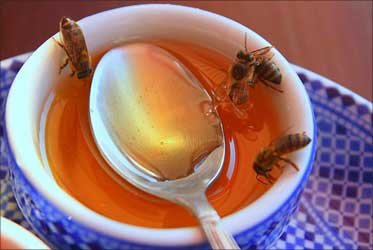
CSE has found a cocktail of mostly banned and severely prohibited antibiotics in honey, writes Sunita Narain.
They say, you are what you eat. But do we know what we are eating? Do we know who is cooking and who is serving us the food we take into our kitchens and then into our bodies?
The more I dig into this issue, it is clear that our world of food is spinning in directions that we know nothing about. This is not the way it should be.
Take honey. A sweet preserve that we take for granted comes from the bees that collect it from the nectar of flowers. We pick up the bottle from our local shop, believing that the honey has been collected naturally, it is fresh and certainly without any contaminants.
In most cases, we would even think that small farmers produced it or it was collected from the wild and packaged by large companies.
In any event, we believe it is the honey that nature produced, collected and delivered to us, as nature would have wanted.
But little do we know how the business of honey has changed. Nobody explains that the culture of food is intrinsically linked to biodiversity, of plants and animals.
...

But mess with biodiversity and you mess with food. The ubiquitous bee is one such instance. Some years ago, leading scientific institutions sold the idea of introduction of the European bee (Apis mellifera) into India, as it was a more prolific producer of honey.
This economically viable bee took over the business, virtually replacing the humble but more adapted Indian bee (Apis cerana) from our food. At the same time, the business of honey was also transformed.
It moved away from the small producers collecting honey from the wild and cultivating honey in natural conditions.
It got consolidated into a highly organised business, controlled by a handful of companies.
Now it is these companies that handle all aspects of the trade - from the supply of the queen bee to the paraphernalia of bee-housing, feeding and disease-control to the producers, spread across different states.
It is an outsourced business, run by franchisees whose job is to find places, like the apple farms of Himachal, where there is nectar for bees to suck.
...

We have lost the biodiversity of the bee and we have lost the diversity of the business. Business is not about food. It is about commerce.
But nature has its way of getting back at us. The European bee is now showing signs of over-use across the world.
In the US and in Europe, there is worrying news about honeybee colony collapses - where bees are disappearing from colonies, not to return.
This is hitting crop production as bees play a critical role in pollinating food crops across the US - a service, which is officially billed at some $20 billion annually.
The trade in pollinator bees involves carting bee colonies across the county, where crops need their service.
But now there is evidence that this overwork, combined with the use of nasty new pesticides, new diseases and immune-suppressed bees, is destroying bees.
In India, we are no different. The dependence on one introduced species and emphasis on over-production mean bees are overworked in this competitive business.
As disease grows, the answer is to feed bees antibiotics liberally, mixed in sugar and other syrups. The bee makes honey and with it comes the lethal dose of unwanted antibiotics in our food.
...

When the Pollution Monitoring Laboratory of the Centre for Science and Environment (CSE) checked honey, it found a cocktail of antibiotics - mostly banned and severely prohibited to be in our food.
It found everything from the commonly used Ampicilin, Enrofloxacin, Ciprofloxacin, Erythromycin to the strictly banned Chloramphenicol in the honey made and packaged by the biggest and the most known.
These antibiotics in food are bad for us, as any doctor will tell you, because they add to the bugs getting resistant to antibiotics.
The fact is that CSE's laboratory checked two foreign brands bought from our local store.
We know that there is strict control in these countries against antibiotics. In fact, Europe has kicked hell and banned Indian honey for having these antibiotics.
They do this because they say they care about their health.
...

Good. But the question is what about our health? Who cares about this? Both brands we checked had the same and even higher levels of antibiotics in them.
The fact is that why should they care, when our government does not? The same government, which makes strict standards for the exported honey, could not care about what we are using domestically. There are no standards for antibiotics in Indian honey.
There is certainly no check on what ends up on our tables and in our bodies.
But do not be surprised. This is the age of takeover by the big and the powerful only because we have compromised and have complicit food regulators. The recently set up Food Safety and Standards Authority has been dead on entry.
Do not be surprised. But be angry. This is not a takeover we should allow. It is about us. Our bodies. Our self.